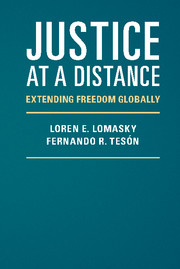6 - Trade
Published online by Cambridge University Press: 05 November 2015
Summary
The thesis we defend in this chapter was well put by a young John Maynard Keynes:
We must hold to Free Trade, in its widest interpretation, as an inflexible dogma, to which no exception is admitted, wherever the decision rests with us. We must hold to this even where we receive no reciprocity of treatment and even in those rare cases where by infringing it we could in fact obtain a direct economic advantage. We should hold to Free Trade as a principle of international morals, and not merely as a doctrine of economic advantage.
This passage underscores two related claims: that trade is widely beneficial at the national and global levels and that tariff barriers unjustly hurt many while unjustly benefiting a few. The argument for trade, like the argument for open borders, is thus overdetermined. It is supported both by sound economics and by commonsense political morality, and it is a crucial staple in a humanitarian policy that seeks to alleviate poverty.
We have argued that justice requires us not to interfere with the pursuit of personal projects. We discussed in Chapter 5 governmental interference with mobility and association. Governments also frequently interfere with voluntary agreements. Justifying such interference is a large topic in political philosophy that we do not fully address here. This chapter addresses one form of governmental interference with contract: the enactment of protectionist laws. These laws assume various forms: tariffs, import licenses, export licenses, import quotas, subsidies, government procurement rules, sanitary rules, voluntary export restraints, local content requirements, national security requirements, and embargoes. All these trade barriers, while different in a number of respects, have this in common: they raise the cost (sometimes prohibitively) of importing goods and services.
We argue that, with very few exceptions, protectionist laws are indefensible on two grounds. First, they are indefensible on principle because they interfere with contracts for no plausible moral reason. Second, protectionist laws have objectionable consequences: they harm persons generally (they cause more harm than good), and they particularly tend to harm the poor. Following a robust consensus in the economic literature, we claim that liberalizing trade would contribute significantly to global and national growth and, mainly for this reason, will help in reducing poverty.
- Type
- Chapter
- Information
- Justice at a DistanceExtending Freedom Globally, pp. 149 - 171Publisher: Cambridge University PressPrint publication year: 2015



